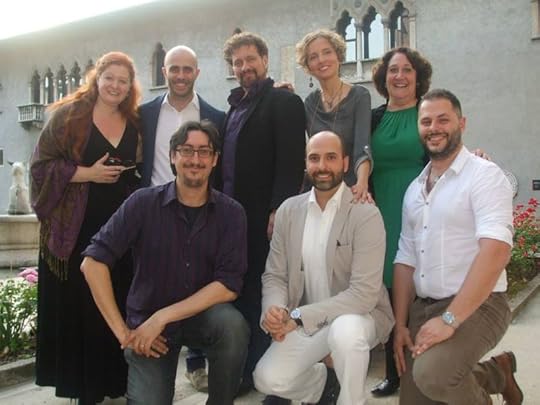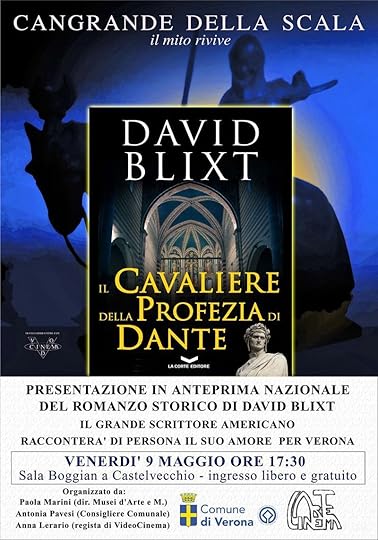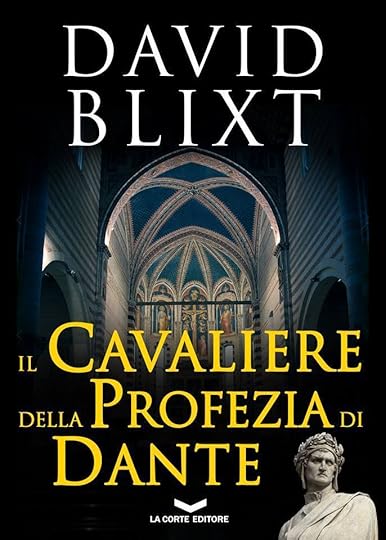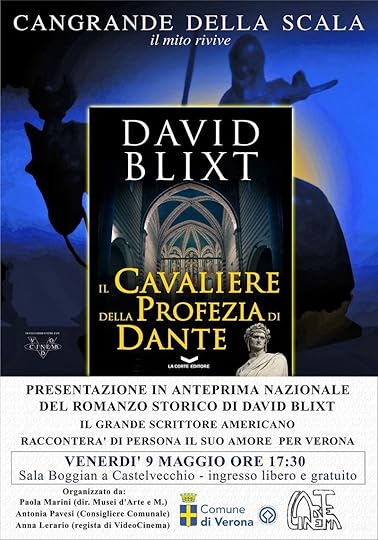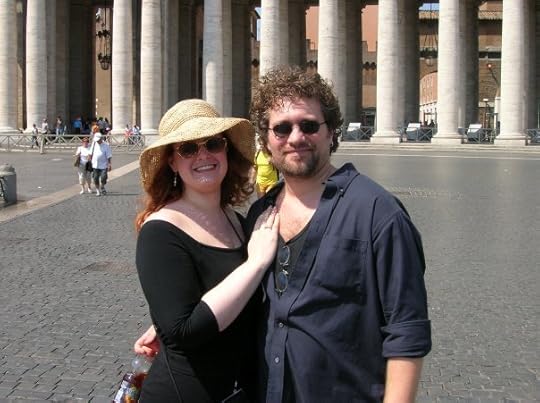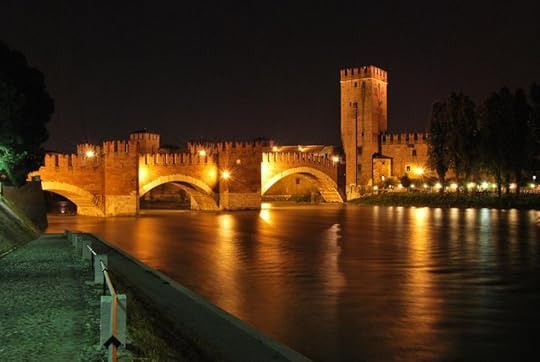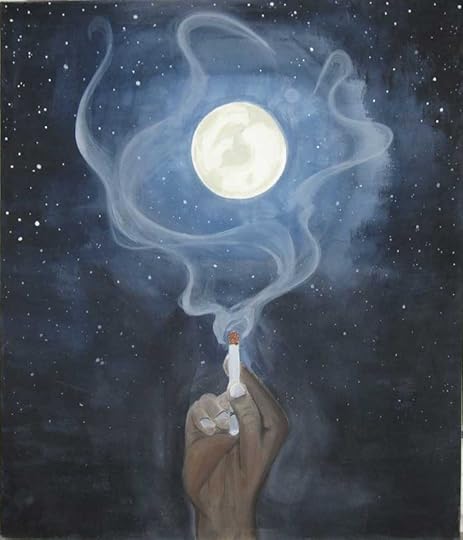David Blixt's Blog, page 9
May 16, 2014
The Castelvecchio Event
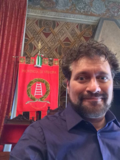 On Friday May 9th I was the featured speaker at an event at the Castelvecchio in Verona. The event was the brainchild of film-maker Anna Lerario and her husband Antonio Bulbarelli, sponsored by the office of the Mayor of Verona, and put together by Verona's Ministry of Culture, all to promote my work bringing the story of the city's history - and especially the person of Cangrande della Scala - to life. It was timed to coincide with the release of my novel THE MASTER OF VERONA in Italian by the publishing house of La Corte Editore.
On Friday May 9th I was the featured speaker at an event at the Castelvecchio in Verona. The event was the brainchild of film-maker Anna Lerario and her husband Antonio Bulbarelli, sponsored by the office of the Mayor of Verona, and put together by Verona's Ministry of Culture, all to promote my work bringing the story of the city's history - and especially the person of Cangrande della Scala - to life. It was timed to coincide with the release of my novel THE MASTER OF VERONA in Italian by the publishing house of La Corte Editore.
It was incredible.
The day actually began with a viewing of Anna's documentary about the province of Verona in a theatre packed with elderly viewers. After the film, I was invited on stage to talk a little, and also to meet a lovely scholar and gentleman named Giovanni Rapelli, who has made it his life's work to study the links of the Latin and Italian tongue to the Etruscans.
Next came a visit to Cangrande's palace, where I was invited to sit in his chair. There are no words for that experience. 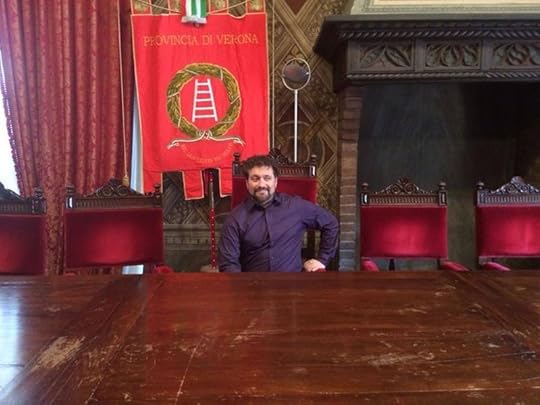
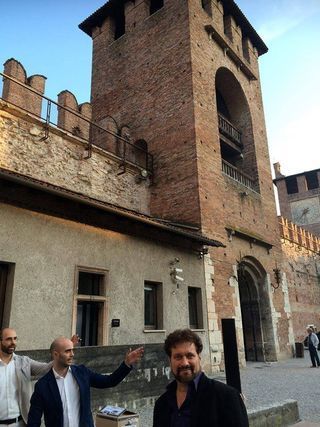 After lunch and a bit of down-time, Jan and I started off for the Castelvecchio. The event was scheduled for 5:30, though we had to wait a bit for all the people swarming downstairs. I was nabbed at the door first by longtime readers, some local, some having come as far as Lyon, France. Then I had a quick interview with a reporter as the dais was set up and everything put into place. Then we were into it.
After lunch and a bit of down-time, Jan and I started off for the Castelvecchio. The event was scheduled for 5:30, though we had to wait a bit for all the people swarming downstairs. I was nabbed at the door first by longtime readers, some local, some having come as far as Lyon, France. Then I had a quick interview with a reporter as the dais was set up and everything put into place. Then we were into it.
250 Veronese packed the hall. There wasn't an open seat, which was both thrilling and terrifying.
Things kicked off when Antonio played the book trailer for my series that Anna had made for me. Singing along with it live was Patty Simon, she of the beautiful voice who had recorded the soundtrack for Anna's documentary on Cangrande and also provided the vocals for my trailer. She's quite beautiful, and ridiculously talented.
Next a representative from the mayor's office spoke for a bit. She was followed by the head curator of the Castelvecchio museum - a museum that houses the famous equestrian statue of Cangrande. He spoke for a time about the prophecy that I feature so prominently in my novels, that of The Greyhound (Il Veltro). He said it was the only true prophecy in all of Dante, and that I'd gotten it right.
He was followed by my publisher Gianni La Corte, who spoke about how Anna had reached out to him on my behalf, and how swiftly he became enamored with my writing and the story I was telling.
Then it was up to Anna to speak for a bit. She began by reading part of the letter I had written Verona to sell them on the trip. That done, she told the story about how she had bought my book when she was doing research for her documentary on Cangrande, but did not open it until she was finished because she didn't want to be influenced. Reading it, she was amazed at how many things this American author from Chicago had gotten right (this was a recurring theme all week - why was an American writing about Verona?). She told the story of how she'd contacted me early in 2013, and how swiftly we began colaborating. For me, meeting her and her husband was one of the best parts of the trip.
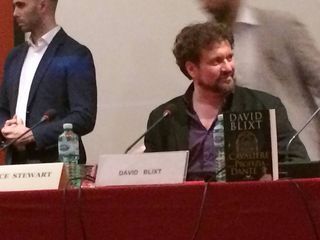 After Anna read a little more, this time directly from my novel, it was my turn. Anna asked me a few questions, and I answered through the kind voice of Joyce Stewart, a wonderful American living in Verona who acted as my interpreter. Then Anna started fielding questions from the audience. The more I talked about Dante, about Petrarch, and especially about Cangrande, the more the audience glowed. I wasn't hanging my hat on Shakespeare. I knew their city. The comment was made over and over that I know the history of Verona better than most of the people who live there. Which is ridiculous, but a lovely thing to hear.
After Anna read a little more, this time directly from my novel, it was my turn. Anna asked me a few questions, and I answered through the kind voice of Joyce Stewart, a wonderful American living in Verona who acted as my interpreter. Then Anna started fielding questions from the audience. The more I talked about Dante, about Petrarch, and especially about Cangrande, the more the audience glowed. I wasn't hanging my hat on Shakespeare. I knew their city. The comment was made over and over that I know the history of Verona better than most of the people who live there. Which is ridiculous, but a lovely thing to hear.
The actor who played Cangrande in the filmgot up to ask a question. His name is Yuri Castorani, and he's as tall, as strapping, and as genial as one would want Cangrande to be. 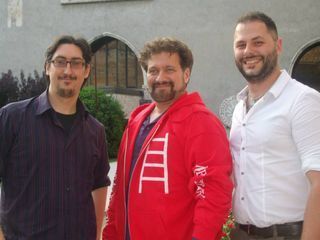
He runs a sword fighting society in Verona, and after the event he and his second, Fabio Scolari, presented me with a hoodie bearing the Scaligeri crest and the legend "SCALIGERO SINCE A.D. 1262".
At one point I referenced my wife, sitting in the second row of the audience beside my American friend David and his French wife (and just behind the Minister of Culture). Anna then insisted that we perform a little Shakespeare for the crowd. We went with what we know, the show in which we met - The Taming Of The Shrew. After all, Petruchio is from Verona, going to war with a Paduan heiress and "taming" her the same way Cangrande tamed Padua - he killed it with kindness. We only went part-way through the wooing scene, ending with Jan slapping my face with a resounding crack that made the audience gasp before bursting into applause.
I answered a few more questions, then it was time to sign books. I was happily surprised to have such a long line waiting for signatures - I think Gianni was pretty stoked to have sold all the copies he brought with him. The book had just come off the press literally the day before, and Gianni had driven in from Torino for the event, forgoing an afternoon of the huge book fair that draws almost half a million people each year. I was going out to join him there the next day.
(That's Jan, Gianni La Corte, me, Anna Lerario, and Joyce Stewart standing. In the front row we have Fabio Scolari, Antonio Bulbarelli, and Yuri Castorani)
Then it was time for pictures, thanks, and drinks. While Jan flirted with Yuri, I asked Joyce to help me translate my favorite toast, one taught to me 14 years ago by the actor Dan Kenney:
Here's to lying, stealing, cheating, and drinking.
When you lie, lie to save a friend
When you cheat, cheat death
When you steal, steal the heart of the one you love
And when you drink, drink with me my friends
A perfect end to a perfect day.
May 9, 2014
Tonight, Verona
Shortly I'll be taking the stage at the Castelvecchio in Verona, the castle built in the 14th century on the shores of the Adige river. In many ways, it's the culmination of half a lifetime of work. I first played Mercutio when I was 17. A few years later, I had the idea for the novel when directing R&J for the first time. The Master Of Verona was first published 7 years ago. Tonight I take the stage to offer Verona my blending of their real history with the one Shakespeare gave them. For while 'fair Verona' is known the whole world over for star-cross'd love, no one ourside the city's walls knows of Cangrande and how massively influential he was to the birth of the Renaissance.
I know my words will fail to share the scope of the love I have for this city - its history, its mythology, its people. But I'll do my best. Wish me luck.
May 6, 2014
Master Of Verona week begins!
This week sees the release of the Italian translation of THE MASTER OF VERONA!
IL CAVALIERI DELLA PROFEZIA DI DANTE will appear at the Torino Book Fair this Saturday. Huge thanks to Gianni La Corte of La Corte Editore for publishing it so swiftly! And equally enorous thanks to Anna Lerario, the film-maker who is masterminding this whole trip. I'm hopping a plane today to fly me to Verona to talk about how the book came to be, and what's in store for the rest of the series.
But that's not the only news for THE MASTER OF VERONA. A new edition is available in print, with a cover to match the rest of the series! You can buy it here!
Moreover, for the first time the Spanish language edition of the novel, EL AMO DE VERONA, is available as an e-book exclusively from Amazon Kindle.
So much news, kicking off what I'm sure will be a wonder-filled week. Catch you in Verona!!!
May 3, 2014
Countdown to Torino!
One week from today I'll be in the city of Torino, signing copies of IL CAVALIERE DELLA PROFEZIA DI DANTE at the international book fair. Looking forward to seeing everyone and everything - including an illustrated copy of the Divine Comedy several hundreds of years old! Also anticipating a long night of drinking and laughter afterwards with friends old and new. Bella Italia!
May 1, 2014
Next week!
I'm slowly allowing myself to get excited for the trip to Verona next week. I've had my head down, trying to finish projects or at least get them to a good holding place so that I can disappear for a week and just revel in the fun of travel and friends, old and new. I'll be seeing film-maker Anna Lerario and her husband Antonio, my erstwhile editor Marina Bonomi, my Italian publisher Gianni La Corte, and hopefully be able to visit with my first Veronese friend, Antonella Leonardo. As an added bonus, I'll be able to catch up with Chuck Dvorak, who's stationed in Germany. He played Tybalt for me back in 2008.
The trip is front-loaded, with lots of book-promotion and such. There's talk of Italian TV, which frightens me. But on Friday I'll be getting up in front of a crowd at the Castelvecchio in Verona (where the statue of Cangrande is lodged), and talking about how the series came to be. Then I hop a train to Torino for the Torino Book Fair, where I'll be signing copies of the new Italian edition of The Master Of Verona.
But best of all, this has turned into an impromptu third honeymoon. Jan and I went to Europe in 2002 just after we got married, and spent 3 and a half months traveling - Athens, Crete, Delphi, Brindisi, Pompeii, Napoli, Rome, Floernce, Ravenna, Verona, Paris, Dublin, Edinburgh, Bath, Stratford, and London (among others). It was a fantastic tour, with over a month spent in Italy alone. Then in 2005 we went back with my parents and brother, who had never been, and did the Italian leg again, with the addition of Venice. So we added a few days to the back end of this trip, allowing us to bum around Italy for a few unhurried days, taking in favorite sights and finding new ones.
I'll post whenever I'm able. Be sure to check my Facebook page and also on Twitter. And when I return, we'll start gearing up for the release of The Prince's Doom in June!
March 14, 2014
EVE OF IDES tonight!
2058 years ago tomorrow, Julius Caesar was assassinated. On this, the anniversary of the eve of his murder at the hands of his political rivals, the Michigan Shakespeare Festival is having a one-night-only concert reading of my play, EVE OF IDES. Directed by Jan Blixt, the cast includes John Seibert as Caesar, Robert Kauzlaric as Brutus, Derek Ridge as Mark Antony, and Charles Sutherland as Varro, with Dan Helmer reading the stage directions and providing voices.
It’s hard to think of any historical figure more redeemed with the stroke of a playwright’s pen than Brutus. Before Shakespeare’s play, he lived in an icy lake at the bottom of Hell. In The Inferno, Dante gives Lucifer three mouths, allowing the Devil to chew forever history’s greatest betrayers: Judas Iscariot, Caius Cassius, and Brutus. Right through the Renaissance, Brutus was a villain, the treasonous coward who killed perhaps the greatest military and political leader the world had ever known.
Yet, in an act of brazen daring, Shakespeare turns Brutus into a hero.
We all agree that Shakespeare’s play is Brutus’ story. For a piece entitled The Life and Death of Julius Caesar, it’s astonishing how little of Caesar there actually is — no Consulship, no pirate ship, no Gaul, no Civil War, no Pompey, no Cleopatra. We pick up at the end of the dictatorship, mere days before his death. Alas, Caesar was far too successful in his life to be made into a tragic hero. So Shakespeare, in his brilliance, turns 1600 years of history on its head, transforming Caesar into a half-deaf epileptic narcissist. Instead he makes his play about Brutus, the honorable man. It is incedibly subversive, a remarkable feat of daring.
If there is one glaring dramatic fault in Shakespeare’s Julius Caesar, it is the lack of interaction between Brutus and Caesar themselves. Shakespeare’s audience was much more knowledgeable about Roman history, so he could take for granted that the nuances would be understood. Today we are not so well informed of the great and twisted personal relationship these men had. We do not know why Brutus repeatedly says he loves Caesar, nor do we see how they got to the point where murder is necessary, where Brutus believes that it indeed ‘must be by his death.’
As I am always drawn to gaps in stories, this was a siren’s call I could not resist.
The event is being held at the Kerrytown Concert House in my hometown of Ann Arbor. And the food for the event is being provided by Mani Osteria in downtown Ann Arbor (huge thanks to Adam Baru). If you're in Michigan, you can reserve your tickets here.
If you're not around, there's still a treat for you. To help promote the event, this week Amazon is giving away free Kindle copies of the play. You can get yours here. In return, I'd ask you to donate $5 (or more) to the Michigan Shakespeare Festival for their kindess in hosting the event. You can send your donations via Paypal here.
March 13, 2014
Tomorrow Night - EVE OF IDES in Ann Arbor
On Friday night, March 14th, at the Kerrytown Concert House in Ann Arbor, the Michigan Shakespeare Festival is having a one-night-only concert reading of my Caesar/Brutus play, EVE OF IDES. Directed by Jan Blixt, the cast includes John Seibert as Caesar, Robert Kauzlaric as Brutus, Derek Ridge as Mark Antony, and Charles Sutherland as Varro, with Dan Helmer reading the stage directions and providing voices. And the food for the event is being provided by Mani Osteria in downtown Ann Arbor (huge thanks to Adam Baru).
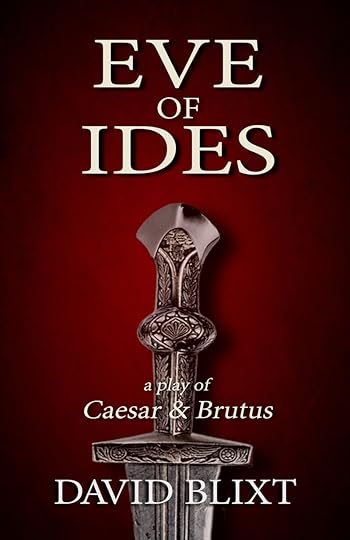
I haven't heard a full reading of the play since it was performed at the Shakespeare Theatre of New Jersey, and just as then, I'm excited to hear the audience reaction - especially during an election year. While I wasn't trying to write about modern politics, the parallels are unavoidable.
If you're in Michigan, you can reserve your tickets here. If you're not around, there's still a treat for you. To help promote the event, this week Amazon is giving away free Kindle copies of the play. You can get yours here. In return, I'd ask you to donate $5 (or more) to the Michigan Shakespeare Festival for their kindess in hosting the event. You can send your donations via Paypal here.
March 10, 2014
Oh, Verona!
Below is the letter I penned for the mayor of Verona, proposing the trip I'm making in May of this year. They responded immediately, which was a testament more to the hard work of Italian filmmaker Anna Lelario and her husband Antonio, who have spent the last year championing my work, culminating in this event.
To the City of Verona,
You may not know me, but I know you very well. I know your history, I know the shape and feel of your streets. I know your ruins, your towers, your bridges, your churches, your palaces, and your princes.
I met you, just as most American children do, through the works of Shakespeare. I always hated Shakespeare. They made me read him. First it was Julius Caesar, then Romeo & Juliet, which was enjoyable only because we watched the Zeffirelli film. That was my first sight of you.
Then, in my senior year in high school, I took an acting-Shakespeare class. As it happened, the teachers had chosen Romeo & Juliet to do that year. I remembered from the film that Mercutio was the best part in the show, and after auditioning against the rest of the class, I landed the part.
It was somewhere in the middle of rehearsals when I fell in love with Shakespeare, discovering he is meant to be spoken, not read. Today I am a Shakespearean actor, something I would never have believed twenty years ago. Shakespeare even introduced me to my wife, whom I met playing Petruchio to her Kate in The Taming of the Shrew. Once again, I was playing a character from Verona.
In 1998, on the eve of directing Romeo & Juliet for the first time, I visited you. It was only for a day, a quick jaunt up from Florence during a five-day trip. It was rainy, and the streets were slick as I rushed from site to site, drinking in the Shakespeare connections without knowing what I was really looking for. I swore I would return.
Back at home, while working on the play, I discovered many things. Including a cause for the famous Capulet-Montague feud, one I’d never heard before. Even when the play was over, the idea wouldn’t let me go.
Thus a book was born.
I started writing The Master Of Verona in the fall of 2000. The original title was Il Veltro, because by then I had discovered the real Verona, the one buried beneath the Shakespeare. For the first time in my life, I read Dante. I studied the letters that Petrarch found in your church libraries. I learned about Ezzelino, Mastino, Alberto, Bartolomeo, Alboino – and Cangrande. Most of all, Cangrande.
My main character was Dante’s son Pietro Alighieri, swept up by Cangrande’s charisma and daring into the wars with Padua, while trapped between two friends who fall out over a woman – young Capulet and Montague. I also created a life for Cangrande’s bastard son Franceschino, turning him into the character Shakespeare called Mercutio. My goal was to blend the real history of Verona with all the tales Shakespeare set there. Petruchio, Kate, Grumio, Valentine, Proteus, Romeo, Juliet, all rubbing shoulders with Castelbarco, Nogarola, Carrara, and Cangrande.
In 2002, on my honeymoon, I returned to Verona. Though we only stayed a week, that visit has shaped me for the last dozen years. With the help of Antonella Leonardo at the Ministry of Culture, I was introduced to the sights, the tastes, and the people of Verona. I dined and wandered the city with Rita Severi of the University, along with her husband Paolo. We toured the Roman ruins, both above and below ground, with Daniella Zumiani. And we visited the estate of Pieralvise Serego Alighieri for coffee and a tour.
I returned to Chicago with a treasure-trove of books and photos and sensations and wonders. My novel changed drastically, and then sold to a publisher. Just before the sale, my wife and I returned to Verona, bringing my parents with us. Then St. Martin’s Press bought the novel, which was published in the summer of 2007.
Since then I have written other books, some set in Rome, one in England. But I am always drawn back to the story of Cangrande, his bastard heir, Pietro di Dante, and the wars with Padua. These tales are told in Voice Of The Falconer and Fortune’s Fool. Just this week, I have finished writing the death of Cangrande for the fourth novel in the series, The Prince’s Doom.
I have loved Verona up close, and from afar. And at last I’m able to share some of that love with the people of Verona.
When filmmaker Anna Lelario contacted me about using my title for her documentary, I had no idea what a lovely partnership was in the offing. It has been a true joy to collaborate with her and her husband Antonio Bulbarelli. Their passion for my work is flattering, especially considering the quality of their own. We plan to release a combined English edition of The Master Of Verona with a DVD of her film on Cangrande’s life, all in an effort to promote Verona beyond the confines of Shakespeare.
Then came the chance I had never dreamed would come. The publisher La Corte Editore purchased the rights to publish an Italian-language version of The Master Of Verona, which will be released later this year.
I would love to be present when both these projects come to fruition. Alas, I’m only an author and an actor, supporting a family through words. Though highly praised, my novels don’t support travel expenses. Even to places I love.
Therefore I am asking for the funds to bring me to Verona once more, to bear witness to the release of both versions of my work, to cement my partnerships and visit my Veronese friends, to perhaps even talk a little about my passion for Verona’s glorious past. And to walk her streets once more.
Thank you for your time, and believe me to be,
Very truly yours,
David Blixt
March 7, 2014
Heading to Verona!
At last I can announce two enormous pieces of news.
First, an Italian-language edition of THE MASTER OF VERONA will be published by La Corte Editore later this year. I don't yet know what the title will be - my original title for the novel might do. It was IL VELTRO, which my readers know translates to both The Greyhound and The Bastard. So appropriate. It's been a dream of mine to release this book in Italy, as it's so steeped in Italian history and legend. I must thank Gianni La Corte for his excitement and daring, and also filmmaker Anna Lelario for acting as my Italian advocate. It is truly a dream come true.
The second piece of news is directly related to the first - the City of Verona has graciously offered to fly me out to present my books to the people of Verona in an event at the Castelvecchio on the 9th of May. This coincides with a special English language edition of THE MASTER OF VERONA that will be sold in Verona's shops and bookstores in conjunction with an English edition of Anna's tremendous documentary on the life of Cangrande, which you can purchase in Italian here.
I must first thank Verona's mayor, Flavio Tosi, for his support of the event and of my work. And I must also express my deep appreciation to Anna Lelario and her husband Antonio Bulbarelli for their tireless work in bringing this event to life. It has been a real joy to collaborate with them. It always amazes me where art can lead.
So I'm off to Verona in a few months, just before the release of the latest of the Star-Cross'd novels, THE PRINCE'S DOOM, which I am about to start the final edits on. For fourteen years I have imagined just such an event, never once dreaming it would come to pass. I am humbled and honoured and can barely speak for my excitement.
There will be so much more in days to come, so keep in touch. And thank you to all my friends, American, Canadian, British, and Italian, for the outpouring of support. And I hope I'll see some of you next week at the public reading of EVE OF IDES in my hometown of Ann Arbor.
Ave, DB
October 31, 2013
Dreaming Of A Paper Moon - A Story
Preface to “Dreaming
of a Paper Moon”
The first novel I ever wrote was entitled
Setting Fire to the Paper Moon.
(That’s a lie. The first novel I ever wrote
was called The Black Beret, a daring
sci-fi adventure parody I wrote in high school. But we don’t speak of that.)
I wrote Paper
Moon when I was nineteen. I wrote it longhand, in a leather-bound blank
journal in a house in Riverside, Illinois. The house was empty because my aunt
had died that summer, and my uncle decided to go away for awhile and not be in
their house. So for two weeks I was there alone. And I wrote the whole time.
The result was a strange and lovely novel, part me, part Jonathan Carroll, part
Somewhere In Time.
I’ve always maintained that Paper Moon should live in a drawer. That
it was the novel I had to write about me so I could get out of my own way and
write the stories I wanted to write. And that’s certainly true. I’m the author
of my novels, not a character in them (thank heavens). Whereas the lead in this
novel was very much me. Not in terms of history, or even looks or sense of
humor. But in his heart.
The novel’s a mess, but a good one. Looking
at it now for the first time in twenty years, I’m moved by how raw it is. A
part of me doesn’t want to touch it. I like having a record of me at nineteen,
locked in a drawer, safe forever. A kind of eternal youth.
Nevertheless, I have friends who read it
back then and still press me every year to pull it out, dust it off, and put it
out there. And I have to admit, as the years go by, I hate the idea less and
less.
So this is me dipping a toe in that
water. I’ve taken one scene from about a third of the way through the novel,
and written just a little at the top and bottom to make it whole, so it can
stand alone.
Why this scene? Because this is the scene
that made me realize I was a writer.
Be kind. This writer is very young, still.
Dreaming of a Paper Moon
I
was driving north from Bath, focusing on shifting gears with my left hand and
keeping on the wrong side of the road, when a rainstorm hit so hard I had to
pull over and wait it out. “Perfect,” I said to no one.
I
was next to a field of some kind. The rain was so thick I couldn’t see at all.
But when the lightning flashed it lit up the whole field. There were trees and
a fence that looked old and run down. Grass, thin and tall and beaten down by
the rain and wind. In the distance there was some kind of tunnel or bridge.
Looking
at that tunnel, it was like someone suddenly flipped a switch. All at once gray
day turned to a clear night. Moon and stars glistened high over wispy clouds.
The night air was cool on my face.
“Come
on!” I was shouting over my running feet. My voice was odd in my ears. Or else
the words were. But more odd was the sound in the air above us.
The
woman was running just behind me, children all around her. She didn’t bother
holding her long skirt, using her hands instead to usher the children ahead, in
front of her. She wore a silly hat with a curled brim and a small grouping of
flowers at the front. Her bangs hung down under it and every moment or two she
would toss her head a fraction to get them out of her eyes. Then she would bend
again, keeping herself close to her charges.
Ahead
I thought I could make out the frame of a building. It was dim, there were no
lights anywhere, but as we drew closer I became sure that had to be what it
was.
“The
barn!” I said loudly over my shoulder, pointing. She nodded and drew closer to
the puffing children. Without missing a step she whispered for them to make for
the barn.
“Miss
Ro—” began one of them, a boy, but he was shushed by a girl running next to
him. He clearly wanted to trip her in return, but this was important, and what
was worse, he knew she was right.
We
almost reached it. I was at the head, under twenty yards away when I head the
whistling. I turned my body slightly and crouched down, my hands flying up to
protect my face. Two of the children almost barreled by me, but I threw out my
arms and caught them. “Get down! Get them down!” I was really shouting now,
loud and frightened. The woman went to her knees, pulling children down with
her as she did. I pulled the two I had caught close into me like a swan,
pressing their faces into my jacket and my face into their hair.
There’s
no describing what happens during an explosion. The world shakes and rocks and
you have no idea what is where. Legs feel like rubber balls strung on a paddle,
moving in all and no directions at once. You can only hope the string doesn’t
break. Everything is confused in a jumble of senses.
Luckily
my instincts served better than my conscious mind at making sense of things.
The first bomb hit fifty or sixty yards to our left. The moment it went off I
bent a little, and in a second my head was up. Scooping up the boys, one under
each arm, I ran for the blast point. I kept my head down, but I could already
see the woman – hardly more than a girl herself – poke her head up out of the
huddle of children, looking for hurts. I’m sure she started rising to send them
after me but the second bomb went off.
The
impact was enough to send me into the air, up about three feet, then back down,
completely lost and pitching forward. The boys made hardly a sound as we hit
the earth, a sprawling mass of arms and legs. I managed somehow to keep my arms
about them. Back on the ground the tears began, but these amazing children bit
their lips, refusing to cry.
The
third bomb finally got the barn. I had no sense of anything any longer. At the
sound I covered the boys’ heads with the sides of my coat. A tremendous heat
pressed against my back. My bare hands felt like they were afire.
The
moment the impact passed I turned my head, almost on reflex. The barn was like
a tower made of matchsticks at a party that for the evening finale gets lit and
knocked down. The hand of God didn’t smash it. He just split it with a finger
and the whole of it went flying in splinters. Bits of burning wood were
everywhere in the air. I covered my face as something warm brushed my ear.
Two
more bombs went off on the other side of the barn, but the burning building
sheltered us from the blasts. Then the bombing stopped.
I
turned my head into my greatcoat. The boys had their eyes wide and were
watching me. I looked from one to the other. “What are your names?” I asked
quietly, a smile edging into my voice.
“William,
sir,” said one.
“Phillip,”
said two.
I
cocked my head and listened. The drone of the planes disappeared. “Well, lads,”
I said, “I’m Captain Trelawny, and I have the honor of telling you we’re still alive.”
I pulled my greatcoat away from them and grinned. They blinked and rubbed their
sore shoulders.
“Are
they gone, sir?”
“Yes,
Phillip. They’ve gone.”
They
stared behind me at the burning barn. I could not imagine what it was like to
be child in this war. It was so much closer to home than the last one. And that
had been bad enough. Yet with all this fear and paranoia there must have been a
tremendous amount of excitement as well. The great adventure all children dream
of. How horrible to have it come true.
I
turned… yes, she was all right. They all were. The children were standing at
her feet, all looking at the barn. Glancing that way myself, I could see the
interior beams aflame and falling, the roof entirely gone. Soon the last of
those flaming beams would cascade down on one another and the thing would
collapse forever.
One
little boy sniffled. Their keeper patted him on the head and after a sigh I
wasn’t meant to see, she turned so that the burning barn was behind her, one
hand brushing the child’s face, the other holding her gardening hat at her
side. Silhouetted by the firelight, she was beautiful beyond words. Venus,
framed by Mars.
“William,
Phillip, are you all right?” she asked. She was young, very young, a fact that
had not fully impressed itself upon me until she spoke. The boys left my side
and went running over to her. “Yes’m!” they chorused. Then William piped up.
“Captain says they’ve gone. Didn’t ya, Captain?” He peered at me through the
building smoke. So did she, with an earnest look reserved for grownups.
I
hated to scare them, but I had to temper comfort with the truth. “I said they
were gone for now. Doesn’t mean they won’t be back.”
“What
do you suggest?” she asked, taking her silly hat from out her hands and placing
it upon her head. Her fingers tucked the falling curls away, then went back to
petting her younger charges, who clutched at her.
“I
suggest we find some sturdy shelter to spend the night. A place we can sit and
thumb our noses at them if they do come back.” I said this last to a little
girl peeking out at me from behind her flat little sailor hat. I tugged on her
ribbons, then looked up. “Any thoughts? I was only passing through. I don’t
know the area.”
“Well…”
the young miss began, biting the side of her lip, “I believe there’s a railway
tunnel somewhere in that direction, not far from here.” She turned the last
into a question, the notes high. One of those dark curls slipped petulantly out
and fell into her eyes.
“Sounds
fine.” I smiled and put on my best front for the children. “Perfect. Let’s go,
troops. Tally ho.”
We
started off. I stayed near the rear, with the children in a tight huddle in the
middle, and their teacher in the lead. But soon the lights of the fire faded
behind us. The night air drew the smoke from their clothes and the children
became themselves again. They wandered off to the sides, talked and whispered
among themselves or ran up to ask a question. They kept peeking over their
shoulders at me in my rumpled uniform.
One
of them, a girl I will love forever, went up front and asked the young miss a
question. The reply didn’t satisfy the girl, who asked another, and this time
she had a finger shaken at her as well as a scolding tone from lady. The girl
returned to her friends and they continued to talk. The young miss stopped
walking to watch the children pass. She nodded as she counted. When the last
moved by her she smiled and sighed. I drew closer and her smile grew. I paused
next to her.
“Thank
you,” she said.
“For?”
I really wasn’t sure.
“For
taking charge. We might never have got out of the schoolhouse without you.”
A
half-dozen comments came to mind to impress this pretty, courageous young
woman. Luckily I couldn’t get my tongue around any of them and wound up saying
the best thing I could have. “You’re welcome.”
A
girl giggled. The woman beside me looked ahead. Her face broke into a
half-crooked grin. “She wants to know if you’re married.”
“If
I say no, will I get a proposal?” I laughed. So did she.
We
began walking again. I picked up the conversation. “You might well wish you’d
stayed in there, you know. Never know what they’ll hit and what they won’t.”
“I
thought they only hit big cities. London…” She brushed her hair back with her
hand, black hair that fell across the nape of her neck.
“Ever
since…” Whoa, Peter. Little husky, aren’t we? Deep breath. Try again. “Sorry.
Ever since our aeroplanes moved out to the coasts the damn Luftwafe have been
trying every place that could possibly hide one. They know our forces are split
up and separated for safety. There are no hangers or runways to bomb.”
“Are
you with the Flying Corps, Captain?”
“No,”
I said, trying to defuse the topic with my tone.
“What
are you with?”
“I’m
part of a – fact-finding group attached to the Home Office.” Not a clever lie
at all.
She
gave me a curious look. “And what are you doing out here?”
“I
landed at Dover yesterday, on my way back from the continent. My train was
stopped and we were told to find shelter. I found the school house.”
“The
continent? But isn’t France..?”
“I
barely made it to the coast. I was very lucky.”
“What
was it like there? Was it terrible?”
“Yes.
Terrible is about as good a word as any. I passed through Nice about a day
ahead of them. There were all sort of announcements on the radio, informing
people how to act.” I chuckled. “People were pouring wine on their gardens,
saying French wine would go down French gullets or none at all.” She smiled,
and I continued, “I was lucky. And when I arrived tonight I thought everything
would be safe as houses. Then the air raid sirens went off and the whole train
full of people went scrambling for cover.”
“We
were lucky to have you find us. The schoolhouse might have been a target after
all. I suppose the place is a bit of a barn.”
She
looked at me as if she just remembered something. Taking a couple of quick
steps she stood on her toes and counted, bobbing her head for each child. At
the end she relaxed.
“How
many?” I asked.
“Seventeen,
thank God,” she breathed.
It
didn’t seem proper to ask about her. “Where are they from?”
“London,
mostly.”
“Evacuees.”
She
nodded. “Their families are still there.” She frowned and looked up at me.
“They play all day, we talk. I try to teach them numbers and letters, but it
all seems…useless. If you understand.”
“I
think I do,” I said.
“They’re
so brave. They all pretend, even think they’re happy.” She started to drop back
further, out of earshot of the children. “About ten at night, when they’re
supposed to sleep, they begin to get frightened. They don’t cry much, and
usually when they do the others tell them it’s all right. Then they all come to
me. We spend the night sleeping in the schoolroom.”
Her
eyes glistened. I said nothing.
“They
think they’re safe, you see?” she went on, doggedly pursuing her point. “They
left their families to be safe. Then this! This happens so often. When the air
raid sirens start I can hear them all thinking ‘Why did I need to leave the
city if I’m going to be bombed anyway?’ Oh, Captain…” Her words stopped.
I
could feel a heat in my eyes. There was no answer for her. For any of us. But,
just as if there were, I took her in my arms and held her. Shivering, she
stepped into me, pressing her head against my chest. I could feel myself fall under
the scent of her hair, a sweet, natural perfume made up only of her.
After
a moment she stepped back and looked at me with a child’s eyes, wide, trusting,
afraid. Excited. She was a person to care for. I smiled into those eyes and,
leaning forward, kissed the fallen strands of hair across her face.
A
child’s giggle made us both look ahead. One of the girls was standing, staring
at us with a tiny hand covering her mouth. All the children had stopped and
were waiting. Some wore huge smiles, others looked conspicuously up at the
night sky, at the giant moon hanging over us, so large it looked false. One boy
in a short-brimmed hat and baggy trousers was making silent retching gestures.
She
and I shared a look of culprits caught. I chuckled as she moved away, shooing
the children on. After a moment I started walking as well, thinking suddenly
dangerous thoughts. Was she married? Engaged? How young was she? Couldn’t be
over six and twenty. A sweet age! But that, compared to my almost forty! That
was bad. Nevertheless, a part of me was shrieking, ‘You’ve found her! Don’t’ be a fool!’
I
quickened my pace and fell in step next to her. Jaded years fell away with each
step. I felt younger than I could remember feeling my whole life. It’s queer
what falling in love will do to a body.
I
began to notice all manner of things about her. Her funny walk, legs just a
fraction too long made her gait just a little too wide. But she seemed very
sure-footed. Her tiny ankles were in huge knit socks that fell loosely over the
tops of her small, square, solid shoes that often looked awkward on women. They
looked fine on her. All her clothes looked fine. A scarf, hand-woven I was
sure, swirled around her shoulders, green and blue and purple dancing. A gray
wool sweater with cozy, fuzzy little sleeves.
She
gave me a sidelong glance. When I smiled at her, she blushed, then laughed. A
wonderful sound.
A
burst of light close by made me snap my head around. The boy with the baggy
trousers was flicking away a match he’d lit on his fingernail, watching it sail
into the darkness and burn out in the grass. The boys around him were very
impressed. As he reached for another match, I said rather sharply, “No light.
Even the smallest light could draw their eyes.”
The
boy looked mulish. His eyes held more potential fire than his matches. But he
obeyed.
We
soon saw the train tracks. It wasn’t wise to walk along them – they were an
excellent target – but we turned and shadowed them at a safe distance. The moon
seemed closer to us than before, so large and full it looked false. Unreal.
As
we walked on, I saw a shiver race across the woman’s shoulders. I had my coat
off and around her in seconds. As soon as I placed it I should have slipped my
arm around her as well, but I didn’t. I stepped back again, and continued to
walk at a safe distance. I wanted to feel her hand in mine. I could do it, just
hold my hand out to her. But that same exaltation I felt had a sting in it. She
might say no. I had to laugh at myself. I had braved African trenches, sneaked
over enemy lines, even fought off a gang of toughs on a steamer. I had proved
myself under every crisis life had ever thrown in my path. In the face of that
single ‘no,’ however, I was as cowardly as the timid wave that never reaches
the shore.
But
Fate was looking my way. We were climbing up the slope of a hill when she
slipped. I reached out and caught her in my arms. She righted herself and,
freeing herself of my hold, brushed herself off. Then, with a smile clear and
whole, she slipped her arm through mine and pressed it to her side. We walked
the rest of the way to the bridge like that. If it had been up to me that walk
would have lasted days.
The
tunnel was just in sight. I was helping the woman climb over a small post
fence, children all around straddling the fence themselves, when we heard it
again. All heads turned upwards, peering into the night sky. “Damn,” I
breathed. “Go. Everyone, get to the tunnel. GO!”
The
children began sprinting. I helped their mistress over the fence, but once on
the ground, she didn’t run, but looked to me.
“Run!”
I said loudly. Too loudly. I couldn’t bark orders at her, but I couldn’t let
her stay out where the danger lived.
“Captain—”
she started to protest.
“I’ll
take the count. Seventeen?”
She
bit her lip, nodded. “There were sixteen but one more, just today—”
I
pressed her arm and looked urgently into her eyes. “Later.”
She
looked back at me, her eyes wide open. She leaned forward. For a brief
eternity, we shared each other. She was all I ever needed.
An
instant later we both pulled back and she began to run. She turned mid-stride, skirt
blowing in the night breeze, a hand up to her hat. “Rose! I’m Rose!”
“Peter!”
“I
think, Peter —”
The
sound overhead grew distinctly louder and I panicked. “Go!”
She
turned. Thank God she was doing it. I couldn’t lose her.
I
helped the last stragglers over the fence and then started after the group,
slower, counting. It was a good half-mile to the bridge, and I tried to see
heads in the darkness. The roar of planes rose. There were no sirens this far
into the country. Only the whirring over the clouds heralded the death of
anyone, anywhere.
I
was half running, half slipping down a sudden slope when I counted sixteen.
Seventeen was nowhere to be seen. Hell and damnation. I spun, nearly wrenching
my ankle in the earth, searching. My eyes caught a flicker of movement at the
fence. It was the imp with the matches. How could I have missed him? His
trousers were caught on the old fence. I cursed and pushed back up the hill,
digging into the grass with my fingers. I went as fast as I could. A whistling
in the air told me we had not long.
I
reached the child flat out. He was pulling on the caught leg. Without bothering
about the hitch, I tore the child from the fence, yanking hard to pull him free.
The little demon was a heavy burden. I tossed him down and he was off like
small-shot down the hill.
I’d
barely started around when the world rocked again. I went flat on my face, my
teeth clattering in my head. Another explosion lifted me off the ground, like a
marionette whose lines are twisted, only to deposit me again to the burning
earth.
I
felt warm all over. I wondered for a moment if I was on fire, but this was
different. This warmth was inside me. I tried to push up and bring my knees to
bear, but fell painfully on my side after my legs gave out. I was filled with
indescribable agony as something in my back jiggered.
Hot
now. It hurt horribly. Sweat covered my face. Looking over my shoulder though
the haze I saw it. There was a good three feet of wooden post imbedded in my
back. It jutted out, thick and jagged, at a weird angle.
I
was going to die.
Between
clenched teeth I let out a long breath. Half way through it became a moan. My
face contorted and became a masque of pain and despair. Physical pain was swept
aside by one worse. Why now? Why not an hour before? Why, God, why? Why had I
been allowed to live long enough to love her? Was life that cruel?
The
next time I could see, Rose was there. “You’ll be fine, Captain. Help is on the
way. They’ve got to…they’ll be here soon.” I wasn’t sure to whom she was lying.
She
lifted my head and slid her legs underneath it. It hurt, but I couldn’t mind
that. My grimy face felt sticky and hot. I could feel the blood behind my eyes
pounding. I wasn’t going to live another hour.
She
took off her handmade scarf and began mopping my face. It felt soft and carried
her scent. I closed my eyes. The sensations made me think of my father. He’d
have liked her, I thought. He would have loved to see us get married and have
children of our own. But he was dead. And now so was I. I wouldn’t even live as
long as he had. I wouldn’t get to be a father.
I
opened my eyes and looked at this woman. My thoughts turned to only her. Her
hat was off, and that soft raven hair spilled across her face and brushed my
cheek.
I
held up a hand. She quickly took it. I tried to look at her eyes, but the
firelight was behind, and shadowed her features. Her figure glowed,
flickeringly. I tried to smile. I could feel the softness in my eyes.
“Carry
on,” I said.
She
nodded. “Always. Always, Peter.”
It
seemed important to tell her something. Make sure of her. “Be happy. Be
wonderful—”
Her
only answer was to continue stroking my face. I couldn’t believe how soft her
hand was. I tried to move, but the pain took me. I fell limply in her arms.
“Peter!”
She tried to hold me up. I opened my eyes again.
“You
don’t even…know me.” I spluttered a laugh. “Could…be Mous’lini.”
She
leaned over and brushed my face with her fingers. Closer now I could see a
trace of a smile under her tearful eyes. “Silly.” She said it again and the
smile left. “Silly,” and she began to cry.
The
children gathered around us. I couldn’t make them out in the dim firelight. My
eyes went over them each. They looked back with knowing eyes. All the boys had
taken the caps from their heads.
All
but one.
He
was standing there, trousers ripped, hands in pockets. When my eyes fell on him
he grinned and took out a match. There was something about that face. He hated me,
that was clear. Enjoyed my suffering. With a flick the match blazed to life,
then receded to a mere flutter of light before he flung it at the burning fence.
He never took his eyes from mine as he stepped back and passed from view, into
the fire.
Rose
went on caressing my face until the lights went out of my world. I could still
feel her fingers on my face.
* * *
“What
the fuck!?” I bolted in my seat, gasping for breath, confused by my
surroundings. Fumbling, I pushed at the door and stumbled out into the pouring
rain. In a moment I was soaked head to toe. It didn’t feel real.
I
moved fast. Twenty feet into the field and I was at the fence. I hopped over
and went down on one knee. Yes. There was a patch of earth that looked as if it
had been scooped out long ago. I could barely see it, but my fingers found the
drop in the ground. Grass had grown back. There was no sign of the explosion,
but for the telltale drop in the earth.
I
stood, rain pouring down on me, and found myself unable to make a sound. My
body shook. I’d like to believe it was only because of the rain. I opened my
mouth, but it merely hung without words. I looked down the hill, towards the
bridge…
She
was there. She had to be there. She couldn’t not be there. I had a brief image of Rose, sitting curled up
against a wall in the middle of that tunnel under the bridge, sheltering
herself from the rain and the wind that pelted the land so harshly. She would
be crying, and feel cold. I ran to find her, warm her, hold her in my arms. I
reached the tunnel—
She
wasn’t there.
An
eternity later, I could feel the moment passing, reality imposing itself. No,
not reality. The present. The present was dominating the past. My name wasn’t
Peter. I was in my twenties, not my forties. I wasn’t a spy. I wasn’t even
English! And there wasn’t a damned thing under that bridge now. That time had
gone. Rose wasn’t there. The children weren’t there. Nothing. It was empty.
Empty,
except for one lone match, there, right by my foot. Dry as a bone. Ready to
light my world on fire.

